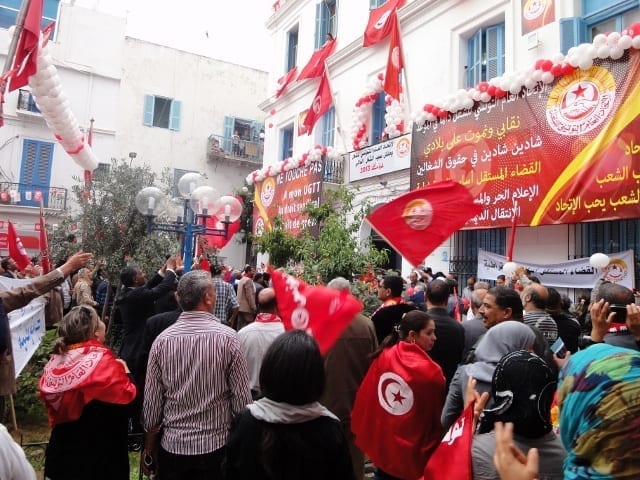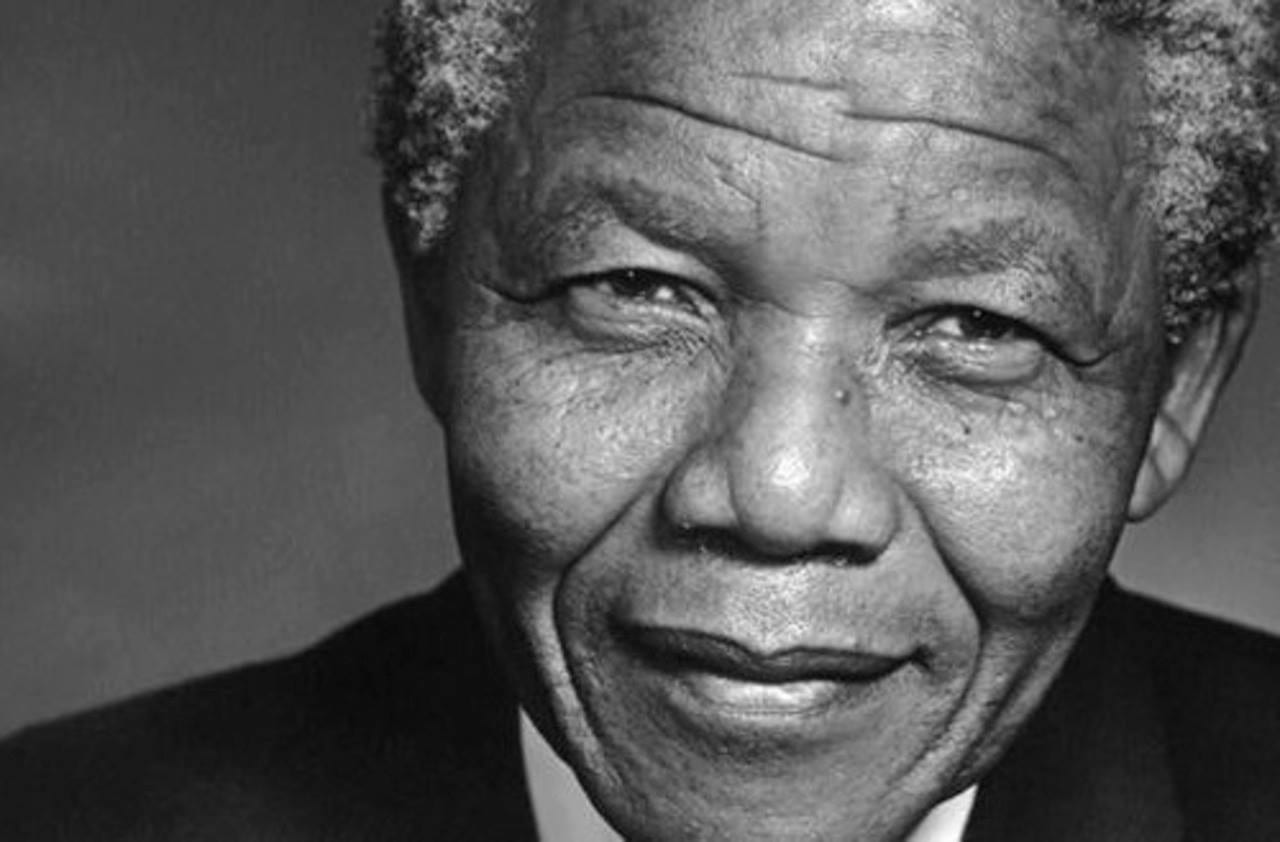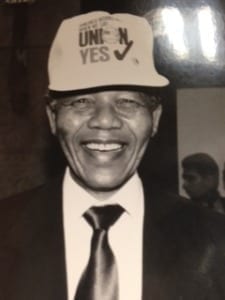
Dec 19, 2013
After months of mediation, participants in Tunisia’s National Dialogue selected a caretaker prime minister just a few days before the third anniversary of the country’s revolution—the spark that started the series of 2011 uprisings known as the Arab Spring.
The National Dialogue is an attempt to bring an end to a political crisis in Tunisia and put the country back on the path to stable democracy.
Houcine Abbassi, general secretary of the Tunisian Labor Federation (Union Générale Tunisienne du Travail, UGTT), acting as spokesperson for the National Dialogue, announced that an agreement had been reached between the ruling Islamist government and opposition parties. Minister of Industry Mehdi Jomaa was nominated to head the Tunisian government until a new constitution could be voted upon and implemented. Jomaa will be responsible for overseeing elections, slated to take place in the upcoming months.
Abbassi and the UGTT have widely been seen as a key force in shoring up Tunisia’s transition to democracy. Despite political assassinations, violence and economic insecurity, the union brokered a solution between government and diverse opposition forces. As the interim cabinet forms, the UGTT has laid out expectations that cabinet will be nonpartisan and will adhere to the National Dialogue roadmap for transition announced in October.
Dec 18, 2013
From the moment Yani arrived in Malaysia for her job as a domestic worker, she toiled for a solid year with no break. Her day started at 4 a.m. and went long into the night, seven days a week, as she cleaned and took care of her employer’s child. Yani eventually became too ill to work, and her employer sent her back to her labor agent in Indonesia. The agent deducted two months’ salary from Yani to pay for her trip back home and abandoned Yani at a port, ill with hepatitis and far from her home. When Yani eventually made it to her village, she had $1 left, just enough for a plate of rice.
Yani is one of 400,000 workers from the Indonesian archipelago who leave their homes every year in search of jobs to support themselves and their families. Globally, up to 100 million people are working outside their home countries, nearly half of them women. Migrant workers contribute to the economies of their host countries, and the remittances they send home help to boost the economies of their countries of origin. Yet migrant workers often enjoy little social protection and are vulnerable to exploitation and human trafficking. Many, like Yani, also are exploited by unscrupulous labor agents.
Today, International Migrant Workers Day, shines a light on the plight of migrant workers. Many toil in domestic work, in agrculture, manufacturing and the service sector. But as several upcoming world sporting events highlight, these high-profile competitions often are built on the backs of poor and vulnerable workers, particularly migrant workers and especially those working in construction.
Currently three countries are preparing for major global sporting events—and workers in all three countries have experienced worker rights violations.
- Workers from impoverished Brazilian states who traveled to Saõ Paulo to work on an airport expansion project in Brazil for the 2014 World Cup faced “slave-like” conditions, according to a recent government investigation. The 111 workers, including six ethnic Pankaruru indians, were living in poor accommodations near the building site and some had paid more than $220 to secure a job.
- More than 80 migrant construction workers in Qatar who worked for nearly a year without pay on an office tower in Dohat are facing serious food shortages and need urgent government assistance, according to an Amnesty International report released today. The 60 Nepalese workers as well as migrants from Sri Lanka, the Philippines, Nigeria, China and Bangladesh, have been fitting out the 38th and 39th floors of a building dubbed “Qatar’s Home of Football” because football-related organizations have offices there.
- Russia’s new law migrant labor law gives employers free rein on how to employ migrant workers without consideration of labor standards. Russian media reports have cited that the “FIFA Law” contravenes the country’s Constitution. Russia is hosting the 2014 Winter Olympics, the 2017 FIFA Confederations Cup and the 2018 World Cup.
The Solidarity Center has partnered with workers, trade unions, governments and civil society coalitions around the world to create community and workplace-based safe migration and counter-trafficking strategies that emphasize prevention, prosecution and protection. These steps include educating workers who plan to work abroad about labor laws and workplace rights in their origin and destination countries; promoting union-run legal aid, counseling and information centers; and helping to draft and pass improved anti-trafficking and safe migration legislation.
Follow International Migrants Day on Twitter with the hashtag #IamAMigrant.
Check out the non-profit anti-trafficking organization, ATEST.

Dec 6, 2013
Stanislaw Cieniuch, former Ambassador of the Republic of Poland to South Africa (1991-1997), recalls his firsthand experiences with anti-apartheid activist Nelson Mandela under South Africa’s apartheid regime. Cieniuch is Solidarity Center Kyrgystan Country Director.
I have been the fortunate witness and participant in two of last century’s historic democratic transitions, first in Poland and then in South Africa. And today, as we mourn the loss of Nelson Mandela, I am reminded of his extraordinary character and his impact on history—and marvel that I had the opportunity to get to know this dedicated and compassionate man.
In June 1981, I was a member of the Polish delegation at the International Labor Organization (ILO) conference in Geneva. Our worker’s group was headed by Lech Walesa, and we were still enjoying a carnival of freedom and solidarnosc at home. It was then that I was nominated as a member of the ILO’s Anti-Apartheid Committee and my involvement with South Africa began.
Ten years later (after the democratic changes in Poland), I was named Ambassador to South Africa, representing our new Poland in a country going through its own rebirth.
Given the pace of change that took place in the six years spanning my diplomatic mission, I essentially served in two nations. I arrived in a country with apartheid laws. But groundbreaking decisions were beginning to change the landscape. Nelson Mandela was free, and African National Congress (ANC) activists were returning from exile or from underground.
My position—as ambassador for a country that had recently gone through its own liberation struggle—allowed me the opportunity to be present at many critical and dramatic moments that led to the end of apartheid, first free elections and then the inauguration of the world’s most famous political prisoner as president of the country.
In every meeting with Nelson Mandela, in offices and private residences, I was always impressed not only by him and his legend, but also by the warmth of his personality, fine sense of humor and serious dedication to his cause. And it was clear to me that perhaps his greatest contribution to South African history was his commitment to inclusiveness. He said:
“I have fought against white domination, and I have fought against black domination. I have cherished the ideal of a democratic and free society in which all persons live together in harmony and with equal opportunities. It is an ideal which I hope to live for and to achieve. But if needs be, it is an ideal for which I am prepared to die.”
During those decisive years, on a sunny Saturday morning before Easter in 1993, Chris Hani, Communist Party leader and chief of staff of Umkhonto we Sizwe the ANC’s armed wing, was assassinated. The murder of one of the ANC’s most charismatic leaders and hero to radical youth brought the country to the brink of civil war. Poland, and me as its representative in the country, were swept up in the aftermath when it was discovered that Hani’s assassin was a Polish immigrant, Janusz Walus, who had conspired with Clive Derby-Lewis, a senior Conservative Party Member of Parliament (MP).
South Africa held its breath, terrified of the angry explosion that might follow. Nelson Mandela immediately addressed the nation and appealed for calm: “Tonight I am reaching out to every single South African, black and white, from the very depths of my being. A white man, full of prejudice and hate, came to our country and committed a deed so foul that our whole nation now teeters on the brink of disaster. A white women, of Afrikaner origin, risked her life so that we may know, and bring to justice, this assassin. The cold-blooded murder of Chris Hani has sent shock waves throughout the country and the world. … Now is the time for all South Africans to stand together against those who, from any quarter, wish to destroy what Chris Hani gave his life for—the freedom of all of us.”
The shame of having my countryman so violently intervene in the course of South Africa’s history weighed heavily on me. My respect for Mandela only grew with his effort to calm the nation and his reassurance to me that my country and people were not to blame.
Later, after the elections in 1994 the new South African leaders invited me to participate in their efforts to reconstruct the country. For example, I took an active part in discussions to design and launch in 1995 the National Economic Development and Labor Council (NEDLAC). This institution proved to be successful in bringing together government, business, labor and community interests to reach consensus through negotiations on all labor legislation and all significant social and economic legislation. I had many conversations with Nelson Mandela about the council’s formation, and he took great personal interest and involvement in the establishment of the NEDLAC.
I was a privileged witness of the events of one of the greatest sagas of contemporary history. That mission did not end on the day apartheid ceased. Mandela dedicated his life to completing the unfinished work of liberation— psychological, economic and social emancipation. Through his leadership, wisdom and generosity, he launched a real movement for reconciliation in a deeply divided society.
Nelson Mandela will always remain a great historical figure for his decisive contribution to the victorious anti-apartheid struggle and peaceful, miraculous transition in South Africa. I grieve his death and am humbled for having worked with him.
Dec 5, 2013
 The Solidarity Center today marks the loss of former South African President Nelson Mandela, whose unyielding struggle to attain equality, human dignity and social justice for his countrymen and women will remain an inspiration to all who still carry on the fight for human rights.
The Solidarity Center today marks the loss of former South African President Nelson Mandela, whose unyielding struggle to attain equality, human dignity and social justice for his countrymen and women will remain an inspiration to all who still carry on the fight for human rights.
“While the world has lost a great statesman and unwavering warrior for freedom, we have not lost President Mandela’s impact on and contributions to his country—and to vulnerable and exploited people everywhere,” said Shawna Bader-Blau, executive director of the Solidarity Center. “He showed the world the true meaning of liberation by taking on all forms of oppression and championing equality. We are awed by his determination and celebrate his extraordinary accomplishments, which are a gift to the world.”
Over the coming week, Solidarity Center staff will join in commemorations of President Mandela’s life and legacy in Washington, D.C., and in field offices around the world.



